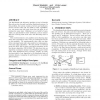214 search results - page 31 / 43 » Finding Optimal Strategies for Imperfect Information Games |
ATAL
2006
Springer
13 years 11 months ago
2006
Springer
The distributed task allocation problem occurs in domains like web services, the grid, and other distributed systems. In this problem, the system consists of servers and mediators...
AAAI
2000
13 years 9 months ago
2000
A common challenge for agents in multiagent systems is trying to predict what other agents are going to do in the future. Such knowledge can help an agent determine which of its c...
GAMESEC
2011
12 years 7 months ago
2011
Recent smartphones incorporate embedded GPS devices that enable users to obtain geographic information about their surroundings by providing a location-based service (LBS) with the...
AROBOTS
2005
13 years 7 months ago
2005
In field environments it is not usually possible to provide robots in advance with valid geometric models of its environment and task element locations. The robot or robot teams ne...
JMLR
2008
13 years 7 months ago
2008
When monitoring spatial phenomena, which can often be modeled as Gaussian processes (GPs), choosing sensor locations is a fundamental task. There are several common strategies to ...

